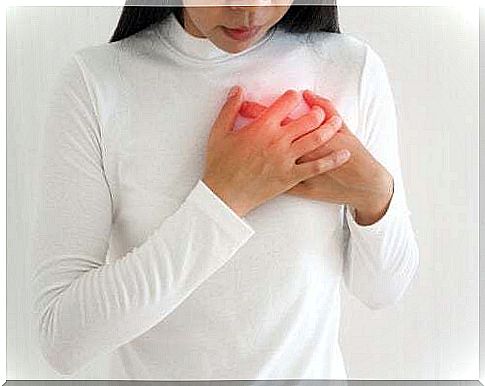Anxiety Tachycardia: Definition And Advice

Anxiety tachycardia is a fairly common condition, especially in today’s society. This is because modern lifestyles promote stress, which leads to states of anxiety. This, in turn, causes a number of physical and psychological problems.
In principle, anxiety-induced tachycardia is not considered a serious health problem and usually does not have major consequences. However, anxiety itself can become chronic and represent a risk factor for more complicated diseases.
Anxiety tachycardia usually lasts only a few minutes and then subsides. Despite this, it often leads us to think that it is a heart attack or a dangerous condition; it is therefore important to learn to recognize and manage it when it occurs.
Anxiety and heart health
Anxious people have a higher risk of long-term heart disease. Anxiety is normal when it occurs in response to a risky stimulus. Almost all of us have experienced one of these episodes in our lifetime.
A very different situation is to suffer continuously from anxiety for no apparent reason. An anxiety disorder can be described if symptoms persist for more than six months. It is estimated that between 5 and 11% of the population suffers from this problem.
Chronic anxiety stresses the heart and can weaken the cardiovascular system in the long term. In severe cases, it could cause heart attack or stroke. This is because hormones and substances released during stressful states increase blood pressure and vasoconstriction.

Tachycardia
Tachycardia is manifested by an increase in heart rate that causes the heart to beat faster than normal. A healthy person at rest has between 60 and 100 beats per minute; for those suffering from tachycardia, the heart rate exceeds 100 per minute.
There are different types of tachycardia depending on the area of the heart where they originate. They can be classified into two large groups:
- Atrial tachycardia: It originates in the upper chambers of the heart, called the atria.
- Ventricular tachycardia: It begins in the lower chambers of the heart, called the ventricles.
Anxiety tachycardia is common, but it is not the only cause of the increased heart rate. This symptom may be due to heart disease, high blood pressure, diabetes, sleep apnea, thyroid disease, anemia, or the use of certain substances. Therefore, it is always advisable to consult your doctor.
Anxiety tachycardia
If the heart rate is too high, the heart is unable to effectively pump oxygenated blood to the rest of the body. In these circumstances, other symptoms may occur, such as palpitations, shortness of breath, lightheadedness and dizziness, tiredness, weakness, chest pain, and fainting.
Anxiety, on the other hand, manifests itself as nervousness, restlessness, or agitation. There is a sense of imminent danger. Breathing speeds up, we tremble, sweat, feel tired and weak.
Other less obvious symptoms are gastrointestinal upset and difficulty falling asleep. A person with chronic anxiety feels perpetually worried and cannot avoid negative thoughts. Anxiety generates physiological changes and is a risk factor for various diseases.

What to do in case of anxiety tachycardia?
Anxiety tachycardia is very common and does not go away until emotions are under control. If we fail, it is best to first understand that this increased heart rate is the result of anxiety.
At times like these, it’s best to find a quiet place and then breathe slowly and deeply for a few minutes. Also, try to evoke a pleasant image, such as a calm landscape, a happy episode, or a person who gives you serenity. After a short time, the heart will return to its normal rhythm.
Similarly, it is recommended to introduce magnesium into the diet, reduce the consumption of caffeine, alcohol and tobacco. Playing sports regularly is one of the best antidotes for fighting anxiety, as well as a powerful cardiovascular protector.









